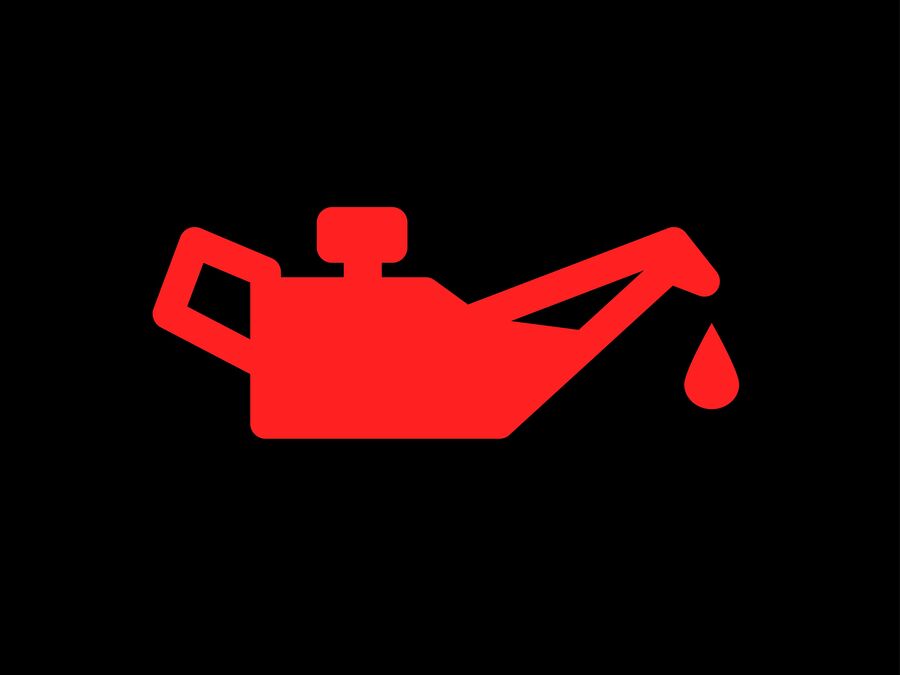Menu

The warning lights on your car dashboard alert you to various vehicle conditions, malfunctions, or potential issues. One of the most important dashboard warning lights to pay attention to is the oil light. There are several possible scenarios when the oil light illuminates. Our talented mechanics have put together an informative list of seven reasons why your oil light turns on and what to do to fix the issues.
The most common culprit when the oil light comes on is severely low oil levels in your engine. This can happen due to leaks or simply as a result of normal oil consumption over time. To check your car’s oil level, pull out the dipstick and wipe it clean with a cloth or paper towel. Put the dipstick back into the oil reservoir completely, then pull it out again. Observe where the oil reaches on the dipstick. There are markings that indicate the acceptable range. The oil level should fall between the "low" and "full" marks. If the oil is below the "low" mark, you'll need to add oil to bring it within the recommended range.
Dirty, contaminated oil doesn't lubricate your engine as effectively as clean oil. This can lead to increased friction and heat, causing the oil light to illuminate. You can check the oil condition on the dipstick when you check the oil level. Fresh, clean oil is amber or light brown in color. As oil ages and accumulates contaminants, it gradually darkens, becoming darker brown or even black.
If your engine isn't running as smoothly as it should, it can put extra strain on the oil system, causing low oil pressure and, in turn, activating the oil light. The common signs of poor engine performance include engine misfires, reduced power, rough idling, and increased fuel consumption. If any of these signs sound familiar, do not hesitate to schedule an appointment with a nearby auto repair service and have your engine checked.
When the oil pump fails to maintain the necessary oil pressure, the oil light will signal that your engine might not be receiving adequate lubrication.
The oil pump circulates oil through the engine. If it malfunctions or wears out, it can lead to reduced oil flow and, subsequently, the oil light turning on.
An often-overlooked culprit is a clogged or dirty oil filter. When the engine struggles to breathe, it can negatively impact oil pressure and trigger the oil light. It’s recommended that you replace the oil filter every second time you get your oil changed.
The oil pressure sensor is the watchdog of your oil system. If it fails or becomes faulty, it might falsely trigger the oil light, even when oil levels and pressure are adequate. A failing oil pressure sensor is not always a sign of disaster, but it’s advisable to have your car checked at a reputable auto repair shop as soon as possible.
When the oil light turns on, seek help from a nearby auto repair shop as soon as possible. It’s not advisable to continue driving with the engine oil light on, as you could end up damaging the engine. Here at Wrights Car Care, we offer a comprehensive range of auto repair services. From oil services and electrical system repair to transmission repair and engine repair, we’ve got you covered. If your oil light has come on and you’re looking for a trusted auto repair service, visit Wrights Car Care today. Our qualified and experienced mechanics will perform a full diagnosis of your vehicle and make any necessary repairs.
Wright's Car Care offers the most reliable import and domestic auto repair services. Read our blog posts to learn more about your vehicle.
Smoke pouring from under your hood or trailing from your exhaust is never a good sign. Your car is trying to tell you something, and ignoring the message can cost…
READ MOREWhen was the last time you scheduled your vehicle’s inspection? If you can’t remember, you’d be lucky if you haven’t noticed countless warning signs, pulling to one side when braking, strange noises, or poor fuel economy. Even if you’re among the lucky few who haven’t experienced noticeable issues yet, it doesn’t mean you continue neglecting your car. Now is the time to schedule maintenance…
READ MORENothing is more unsettling than hearing a squeaking sound every time you hit the brakes. This issue may not seem…
READ MOREAre you having a bad car day? Nothing is more valuable in such situations than having a relationship with your…
READ MORE